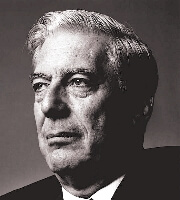About Mario Vargas Llosa
Mario Vargas Llosa, born March 28, 1936, in Arequipa (Arequipa region, Peru), Nobel Prize winner for literature, He died on April 13, 2025, at the age of 89 in the Peruvian capital, where he lived his final months in near retirement, following a prolific career that took him to the pinnacle of Hispanic literature. He was a Peruvian poet and writer, naturalized Spanish. María Jesús Lorenzo-Modia, highlights in an article that the Latin American writer was a poet in his adolescence, publishing in the Piura (Peru) press under the pseudonym Alberto, some poems that he himself later preferred to "be forgotten". While reading poetry, including his mother's bedside book, Twenty Love Poems and a Desperate Song (1924) by Pablo Neruda, the young Mario wrote prose. In 1958, he presented his thesis, "Bases for an Interpretation of Rubén Darío." Already firmly politically inclined and influenced by Jean-Paul Sartre, Mario Vargas Llosa would assert that committed works are narratives, since "poetry can praise the worst regimes in many cases." In the magazine "Literatura," Vargas Llosa conducted in-depth analyses of César Moro's poetry, and in issue three, he wrote the text "Is the Sacrifice of Poetry Useful?"—a"critique of the confusion between commitment and activism. As an example of his criticism of poetry, the Peruvian writer "reproaches Darío's confusion, based on the characterization of certain scenes, between the dramatization of a work-related accident that leaves the worker seriously injured and brings misery to the home and the mythologizing of inhumane working conditions. The poet does not feel what he writes deeply, and the writing of his story lacks sincerity: the reader does not experience the pain that should emanate from the text. The young Vargas Llosa had already conceived another concept of what a literary text must be to be valid. In a certain way, the thesis on Rubén Darío continues that reflection," writes Marie-Madeleine Gladieu.He spent his childhood between Cochabamba (Bolivia) and the Peruvian cities of Piura and Lima. At the age of 14, he was sent to boarding school at the Military Academy in Lima by his father, who did not look favorably on his budding poetic vocation. This episode left him with a grim memory and provided the material for his book, The City and the Dogs. He withdrew from the military academy and completed his studies in Piura. At sixteen, He began his literary and journalistic career with the premiere of the drama The Flight of the Inca (1952), a play that had little success. Shortly after, He entered the University of San Marcos in Lima, where He studied literature. He held a variety of jobs to make ends meet without abandoning his studies: from news editor at a radio station to registrar at the Lima General Cemetery while simultaneously working as a literary proofreader and then contributing to the film sections of the magazine Literatura (1957-1958) and the newspaper El Comercio. In 1955, the scandal surrounding his clandestine marriage to his aunt-in-law, Julia Urquidi 10 years his senior (who would later inspire "Aunt Julia and the Scriptwriter"), further aggravated his situation, and He had to turn to some friends to alleviate his difficult domestic and financial situation.
In the Peruvian capital, He founded Cuadernos de Principios (1956–1957), together with Luis Loayza and Abelardo Oquendo, and later the Revista de Literatura (1958–1959), establishing himself in these publications as the standard-bearer of a group that reacted against the social and documentary narrative of the time. In the late 1950s, He was finally able to travel and settle in Europe, where He settled in Paris in 1959, where he worked in several professions: translator, Spanish teacher, and journalist for Agence France-Presse. He later became a professor at Queen Mary College in London.
Along with Julio Cortázar, Carlos Fuentes, Juan Rulfo, Gabriel García Márquez, Juan Carlos Onetti and José Donoso, Mario Vargas Llosa is considered one of the great names of the Latin American literary boom of the 1960s. To varying degrees, all these authors distance themselves from traditional narrative and claim the influence of European or North American modernist and postmodern literary movements from which they borrow innovative techniques (subversion of fictional codes, multiplicity of points of view, polyphony, fragmentation of chronology, interior monologue or even flow of consciousness following the example of James Joyce and William Faulkner). Their visionary, abundant and luxuriant style has revealed to the whole world the artistic, ideological and political complexity of the South American continent, which they paint as a picturesque, fragmented and paradoxical entity.
Mario Vargas Llosa was a member of the Royal Spanish Academy. He has received the most prestigious awards in Spanish-language and world literature, including the Rómulo Gallegos Prize in 1967, the Cervantes Prize in 1994, the Jerusalem Prize in 1995, and, in 2005, the Irving Kristol Award from the American Enterprise Institute. On October 7, 2010, he received the Nobel Prize in Literature for "his mapping of power structures and his sharp depictions of individual resistance, revolt, and defeat," according to the Swedish Academy.
Browse all poems and texts published on Mario Vargas Llosa









